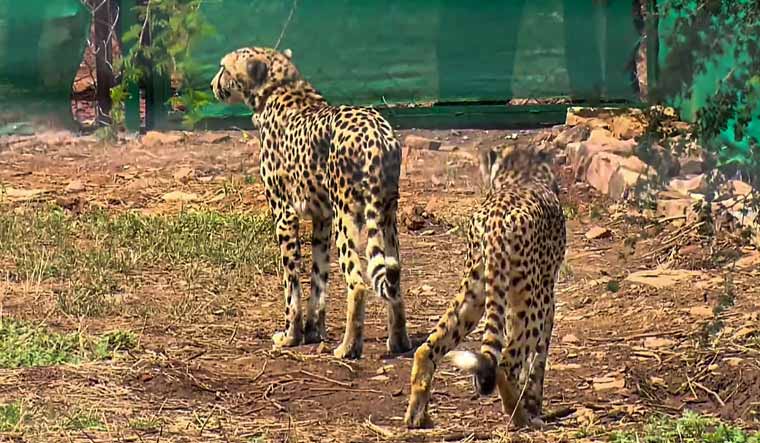Bringing cheer to Kuno National Park in Madhya Pradesh, one of the Namibian cheetahs, Jwala, gave birth to three cubs. The news was shared by Union Environment Minister Bhupender Yadav.
Yadav posted on X: "Kuno's new cubs! Namibian Cheetah named Jwala has given birth to three cubs. This comes just weeks after Namibian Cheetah Aasha gave birth to her cubs."
He further said in the post, "Congratulations to all wildlife frontline warriors and wildlife lovers across the country. May Bharat's wildlife thrive."
A Namibian Cheetah named Jwala has given birth to three cubs. This comes just weeks after Namibian Cheetah Aasha gave birth to her cubs.
— ANI (@ANI) January 23, 2024
Union Environment Minister Bhupender Yadav shares the video on his 'X' handle. pic.twitter.com/dgOsISpTU0
The births bring the number of cubs in the KNP to seven now, with six of them born in this month alone. On January 3, Kuno National Park officials reported that Namibian cheetah Aasha had given birth to three cubs. Before this, a cheetah named Siyaya had given birth to four cubs last March. However, only one of them survived.
Jwala belongs to the first batch of eight cheetahs introduced in India in September 2022. The births amid a pall of gloom in Kuno after Shaurya, a male cat from Namibia, died inside its enclosure last week while being treated for weakness. Shaurya was also the father of the first-ever litter born to Jwala last year.
Before that, the last recorded cheetah death in Kuno National Park was reported on August 2, 2023. Infections caused by insects during the monsoon season were cited by the government as the primary cause of the previous two deaths. A total of 10 cheetahs have died in the park due to several causes so far.
The big cats were translocated to India from Namibia under Prime Minister Narendra Modi's 'Project Cheetah', aimed at re-introducing the only large carnivore species that went extinct in independent India. The second batch of 12 cheetahs was flown in from South Africa last February.
The KNP officials said one of the biggest challenges faced in the first year of managing the cheetahs in India was the unexpected development of winter coats by some of the animals during the Indian summer and monsoon, in anticipation of the African winter (June to September). The winter coat, combined with high humidity and temperatures, caused itching, prompting the animals to scratch their necks on tree trunks or the ground. This led to bruising and exposing the skin, where flies laid eggs, resulting in maggot infestations and, ultimately, bacterial infections and septicemia, leading to the deaths of three cheetahs, an official explained.
"The mortalities under Project Cheetah so far have been within the expected limits. As per Cheetah Action Plan, we anticipated approximately 50 per cent mortality. Right now, 14 imported cheetahs are surviving, besides one cub born on Indian soil," SP Yadav, additional director general of forests in the Union Environment Ministry, had said earlier.


